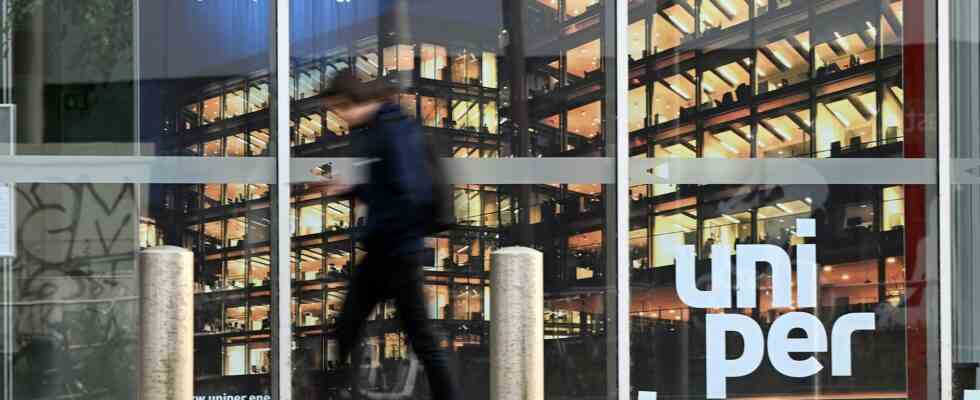Status: 09/23/2022 08:14 a.m
The federal government takes over Uniper for almost 30 billion euros. Economists consider the step to be imperative because the ailing gas importer is systemically important. But it could entail additional costs.
Most recently, during the financial crisis 14 years ago, companies were called “too big too fail” – too big to go bankrupt; bankruptcy could trigger a chain reaction. Uniper now seems to be such a case again. This is the largest German natural gas importer and, according to the Ministry of Economic Affairs, a “central pillar of German energy supply”. More than a hundred municipal utilities buy their gas from Uniper and use it to supply many millions of consumers. There are also numerous industrial customers who purchase gas directly from Uniper.
But the group, which emerged from a spin-off of the electricity group E.ON a good six years ago and has since been in Finnish hands, has relied too one-sidedly on cheap Russian gas. Due to a lack of deliveries, the group now has to buy expensive gas on the so-called spot market in order to comply with long-term contracts. According to Uniper, this leads to losses of 100 million euros a day. The Finnish parent company Fortum has now put the total loss at around 8.5 billion euros.
Entry into the state as a loss-making business?
The German state is now as it were taking on these debts. He is planning a capital increase of eight billion euros. In return, the federal government will receive new shares at a price of EUR 1.70 each. In addition, the state wants to take over the entire 78 percent stake that previously belonged to the Finnish energy supplier Fortum. A further 0.48 billion euros will be due for this. A step in the right direction, believes Michael Heise, chief economist at the private asset manager HQ-Trust. Even if entering the state could be a losing proposition from the economist’s point of view. “At the moment I don’t see any possibility that a large company value will be created there again that would enable the state to make a good exit,” says Heise’s forecast. Uniper has to adapt and access new sources of supply. It will take a long time before the group can get back into the black – if at all. “In this respect, it is unfortunately not foreseeable that the state – as with other state investments in recent times – will make a profit.”
Unforeseeable costs without entering the state
From the point of view of the economist André W. Heinemann, whether the tax billions are well invested is not the economically relevant question in the Uniper rescue. “All direct and indirect social costs that are avoided because this gas importer is rescued should be compared with the eight billion euros that are in the room,” argues the professor for federal and regional financial relations at the University of Bremen to the dpa news agency. According to Heinemann, the question of short-term risks for taxpayers should take a back seat in this case, because the economic costs would be much higher if the state did not act in this way at Uniper.
The Düsseldorf economics professor and government advisor Jens Südekum sees it similarly. The 100% state stake in Uniper has calmed the gas market for the time being. Uniper’s bankruptcy would have thrown the gas market into chaos. Specifically, according to Südekum, in the worst case, millions of public utility gas customers would have been without gas shortly before winter. The state entry into Uniper is therefore not only a rescue of the company, but also ensures that the energy supply of the citizens is guaranteed in winter.
Further state entries are likely to follow
According to economist Südekom, the final costs for taxpayers cannot yet be quantified. The losses at Uniper continued for the time being – as long as the group was forced to buy expensive gas, which it – contractually bound – had to sell cheaper. At some point, when the long-term customer contracts have expired, Uniper could raise gas prices again. According to the economics professor, the municipal utilities will then pass on the increased prices to consumers.
According to insider information from the Reuters news agency, regional suppliers and municipal utilities, like Uniper, need state support because of the explosion in energy costs. The federal government is currently examining possible aid measures. The federal government is also examining information from the ARD Capital Studiosto also nationalize the Gazprom subsidiary SEFE. The former Gazprom Germania – now: Securing Energy for Europe, SEFE for short – is already under federal trusteeship in order to ensure security of gas supply in Germany.
It is currently difficult to estimate whether the state entry into Uniper could still be profitable in the long term. According to Südekum, a lot depends on whether Uniper will succeed in transforming itself into a sustainable company. Because unlike the rescue of Lufthansa, there is no intact business model behind Uniper. A large part of Uniper’s core business was importing cheap gas from Russia. And that, according to the economist, is gone forever.

